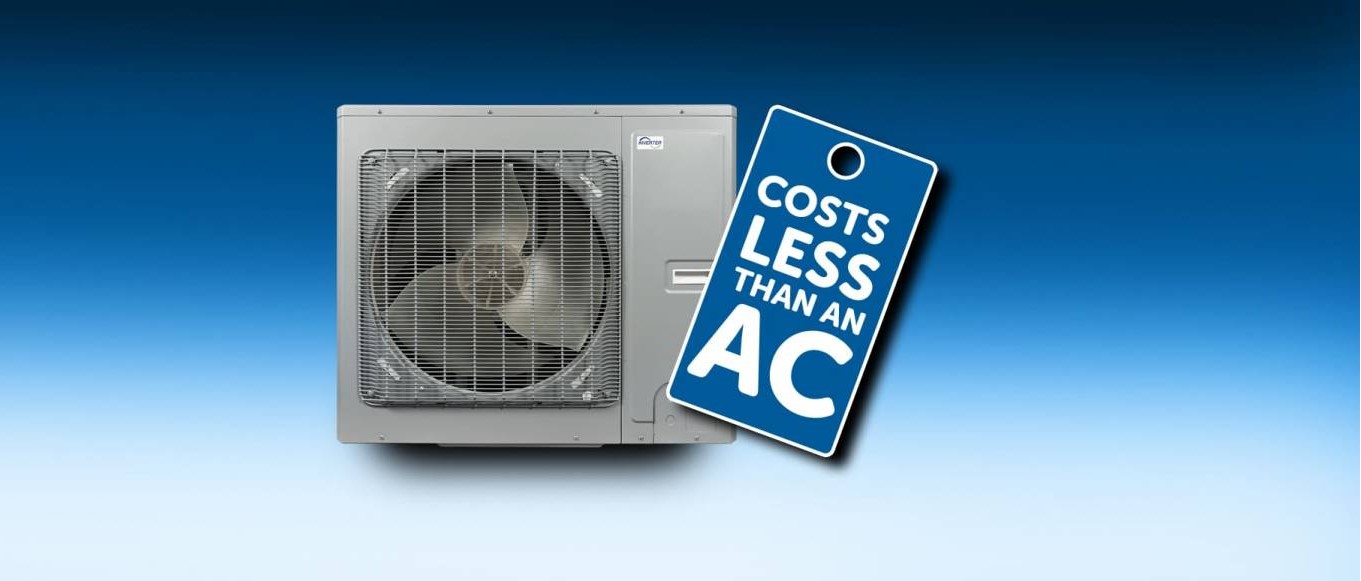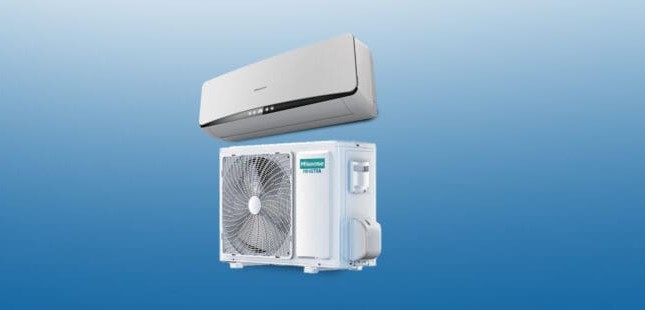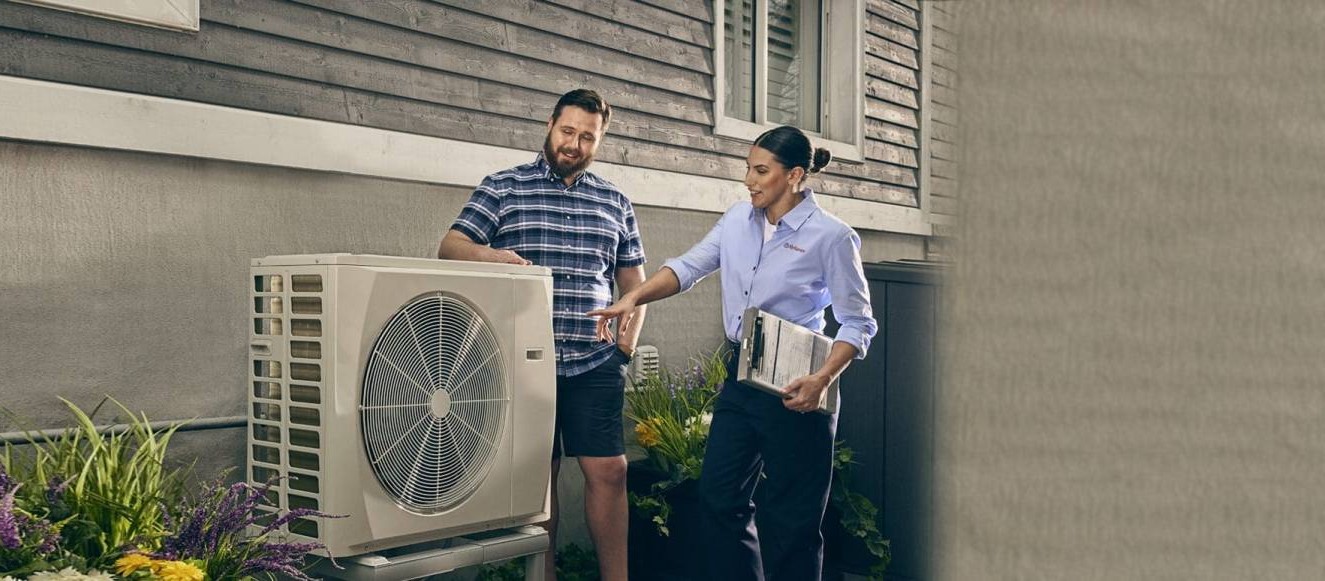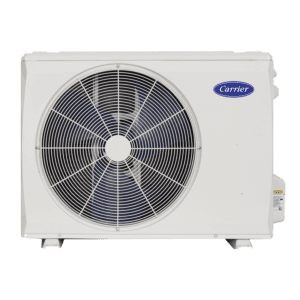



Get sustainable all-season heating and cooling with a heat pump.
Fighting Climate Change with Heat Pumps: A Greener Choice Here
At High Class , we are committed to fighting climate change, and we believe that heat pumps offer Canadians an environmentally sustainable and cost-effective solution for their homes.
Why Heat Pumps Are a Smart, Sustainable Solution for Canadians
Heat pumps are versatile, providing both heating and cooling—replacing your AC in the summer and keeping your family comfortable during milder weather. This dual functionality makes them one of the simplest ways to lower CO2 emissions without compromising comfort.
How Heat Pumps Can Lower Your CO2 Emissions
Heat pumps are more energy-efficient than furnaces at moderate temperatures, and could help reduce both your energy bills and carbon footprint. With Canada’s electricity grid being largely powered by non-carbon-emitting sources, operating a heat pump could further minimize environmental impact.

You Could Save Energy and Money with Efficient Heat Pump Technology

Additionally, since heat pumps are more efficient than traditional heating systems at mild temperatures, they could reduce your energy consumption—potentially saving you money on utility bills while helping to protect the environment.
At High Class, we offer both whole home and ductless mini-split heat pumps for single and multi-zone use—giving you flexible, energy-efficient comfort for virtually any space.
About Heat Pumps
During the summer, a heat pump keeps your home cool by removing heat from inside your home and moving it outside. It keeps your home comfortable in the spring and fall by removing heat from the air outside and pushing it inside. Your furnace only kicks in when the temperature really drops.
- Heat pumps run on electricity and consequently produce lower CO2 emissions than a furnace that burns natural gas.
- Most electricity in Canada is produced through non-carbon-emitting sources, especially in British Columbia and Ontario.
- Since your furnace won’t be running as much, you could significantly reduce your home’s CO2 emissions.
Choosing the Right Heat Pump for Your Home
Not all heat pumps are created equal. Choosing the right heat pump will help it run efficiently, help keep your budget in check and your home feeling comfortable.
Before you choose a heat pump unit, here are a few things to consider:
House Size and Location
How big is your home? Do you live in a warmer or colder part of the country? Both are key considerations when determining your unit size and power.
Insulation
How well is your home insulated? The amount and type of insulation will influence the size and power of the heat pump you will need.
Energy Efficiency
Since a heat pump works to cool and heat your home, there are two ways to measure its energy efficiency. Look at the seasonal energy efficiency ratio (SEER) to check its cooling efficiency, and the heating seasonal performance factor (HSPF) to check its heating efficiency.
The higher the SEER and HSPF rating, the more energy you could save and the lower your operating costs could be.
About Heat Pumps
How Does a Heat Pump Work?
During the summer, a heat pump keeps your home cool by removing heat from inside your home and moving it outside. It keeps your home comfortable in the spring and fall by removing heat from the air outside and pushing it inside. Your furnace only kicks in when the temperature really drops.
Environmental Benefits of a Heat Pump
Heat pumps run on electricity and consequently produce lower CO2 emissions than a furnace that burns natural gas.
Most electricity in Canada is produced through non-carbon-emitting sources, especially in British Columbia and Ontario.
Since your furnace won’t be running as much, you could significantly reduce your home’s CO2 emissions.
Why Choose High Class for Your Heat Pump Installation?
- Experienced Installers: Our heat pump installers are trained and experienced, providing professional and reliable service every time.
- Comprehensive Services: From installation to repair and maintenance, we offer a full range of heat pump services to meet all your needs.
- Customer Satisfaction: We have over 120,000 5-star user reviews on Google from Canadian homeowners like you!
- Support – We are here to support you and are available to take your call 24/7/365.
We are proud to be Canada’s neighbourhood home comfort specialists. Whether you’re ready to explore our new green home solutions, or you need help keeping your existing heating and cooling system in top shape, just Call on High Class.
Heat Pump Installation
Site Assessment & Preparation
Choose the best locations for indoor and outdoor units. Check electrical capacity and clearances.Mount Outdoor Unit
Place on a stable pad or bracket, ensuring good airflow and drainage.Install Indoor Unit
Mount bracket, drill hole for lines, and secure the unit on the wall (for ductless systems).Run Refrigerant Lines & Wiring
Connect indoor and outdoor units with refrigerant tubing, drain line, and electrical wiring.Connect & Seal
Attach refrigerant lines, communication cables, and seal wall openings properly.Vacuum & Charge System
Evacuate air and moisture, then charge refrigerant if needed.Electrical Connection
Wire the system to the power supply with proper breakers.System Testing & Startup
Power on, test heating and cooling functions, and check pressures and temperatures.Customer Orientation
Explain system operation, maintenance tips, and warranty.
Heat Pump Repair Services
At High Class, we provide expert heat pump repair services to keep your heating and cooling system running efficiently all year round. Whether your unit is not heating properly, making unusual noises, or failing to start, our certified technicians have the skills and tools to diagnose and fix the problem quickly.
Common Heat Pump Problems We Fix
If your heat pump struggles to maintain comfortable temperatures, it could be due to clogged filters, refrigerant leaks, or compressor issues. We perform thorough inspections, clean components, and repair or replace faulty parts to restore optimal performance.
Electrical problems are a common cause of a heat pump failing to start. Our team checks circuit breakers, thermostats, capacitors, and contactors to identify and resolve electrical faults safely.
Ice buildup on the outdoor unit often results from poor airflow, low refrigerant levels, or malfunctioning defrost controls. We clean coils, check refrigerant pressure, and test sensors to prevent freezing and ensure smooth operation.
Rattling, buzzing, or grinding noises can indicate loose components, failing motors, or debris in the fan. Our technicians inspect the unit thoroughly and perform precise repairs to eliminate noise and prolong equipment life.
Why Choose Our Heat Pump Repair Services?
Certified & Experienced Technicians
Our team is trained and certified to work on all major heat pump brands and models.Prompt & Reliable Service
We understand the importance of a functioning heat pump and offer timely repairs to restore comfort quickly.Transparent Pricing
No hidden fees—just honest estimates and quality work.Comprehensive Diagnostics
We use advanced tools to accurately diagnose issues and recommend the best solutions.
Heat Pump Maintenance Tips to Avoid Repairs
Regularly clean or replace filters every 1 to 3 months to ensure proper airflow and efficiency.
Keep the outdoor unit clear of leaves, debris, snow, and ice to maintain good airflow.
Schedule annual professional inspections to check refrigerant levels, electrical connections, and overall system health.
Check and clean the coils regularly to prevent dirt buildup that can reduce performance.
Ensure proper thermostat settings and upgrade to programmable thermostats for better control.
Listen for unusual noises and address small issues promptly before they become major problems.
Keep vents and registers unobstructed to maintain balanced airflow throughout your home.
FAQs
What is a heat pump?
- A heat pump is actually an air conditioner that can also run in reverse. In summer, it transfers heat from inside your home to the outdoors, reversing this on cool fall and spring days to move heat from the outdoors back into your home.
- The technology is the same as your refrigerator. Your fridge is a heat pump – it transfers heat from inside the unit, out. That is why the top and back of your refrigerator emit heat.
- There are two kinds of heat pumps – air-source heat pumps transfer heat from the air, and ground-source heat pumps transfers heat from the ground. High Class focuses on air-source heat pumps.
- Heat pumps either come as units that work with your furnace in a ducted home or as ductless splits. They look just like AC units – the only difference is the outside condenser needs to be off the ground on a stand or wall bracket.
What is a hybrid heating system?
- A Hybrid Heating System has a heat pump and a furnace working together to heat the home.
- The heat pump provides heat until it is too cold outside to run efficiently at which point the system will switch over to the furnace.
What is the difference between air source and ground source/geothermal?
Same concept, different equipment. Air-source transfers heat from the air, and ground-source (also known as geothermal) transfer heat from the ground. The ground-source heat pump is very expensive and complicated to install, so we focus on air-source.
What is the lowest temp at which our heat pumps can operate?
Depending on the equipment, your heat pump can operate down to between. -25c and -30c.
They can work to these temps, but the colder it is outside, the harder it is for the heat pump to warm the home. The amount of heat a heat pump can emit decreases with the lowering temps outside.
Could people in the different regions we service potentially use a heat pump all year round?
All customers should have a backup heat source. However, customers in warmer parts of BC and possibly areas of Southern Ontario in milder climate zones like Niagara could benefit from heat pumps for the majority of the year.
Factors that affect when you would switch from your heat pump to your backup heat source:
- Heat pump efficiency
- Backup heat source efficiency/fuel
- Back up heat source fuel rates/cleanliness
- Electricity Rates
- You are changing to your backup heat for one of these reasons…
- CO2 reduction
- Energy Cost Savings
- CO2 savings at current energy costs
Does SEER only apply to cooling efficiency? And what are HSPF and CoP?
- Yes. Heat Pumps have a SEER (Seasonal Energy Efficiency Ratio) rating because they also operate as air conditioners. SEER is like km/litre for your car – the higher, the better.
- HSPF (Heating Season Performance Factor) is the heating version of SEER and measures the heat pump’s efficiency when it is in heating mode.
- CoP (Coefficient of Performance) is the ratio of heat is added to the home compared to the power used by the heat pump at a given temperature. The colder it gets outside, the less efficient your heat pump becomes.
I live in the Prairies, and I thought heat pumps wouldn't work out here.
Yes, they will! A heat pump will be effective for you in spring and fall – you will just use your backup heat source more than if the climate is more temperate.
What happens when the heat pump ices over? What is defrost cycle?
Your heat pump condenser may accumulate some ice if the temperature dives outside. The heat pump has an easy, automatic way to deal with this – it will go into defrost mode, and temporarily reverse itself – working as an air conditioner to send heat to the condenser coils and melt the ice. It will switch back into heating mode once the ice melts.
Does a heat pump look different than an air conditioner?
No – on the outside, they look just like an AC. However, they have some internal differences. The main difference is that the condenser needs to be off the ground on a stand to help with ice shedding.
Does a heat pump use the same amount of energy as electric baseboard heating if it runs on electricity?
Heat pumps transfer heat vs creating it. Transferring heat uses less electricity than an electric heater that produces heat.
Is an air-source installation different than an air conditioner installation?
The installation is similar; however, there are some differences. The heat pump must be installed on a stand to raise it off the ground, and this space allows the heat pump to shed any ice it may accumulate when it is colder outside. Some additional requirements include programming the point at which you want your heat pump to switch over to your backup heating system.
Does the price of natural gas affect whether I should get a heat pump?
Yes and No. It depends on why you are considering a heat pump. If you have natural gas and your only consideration is saving money, then yes, the price of natural gas vs electricity in your area will determine if you should get a heat pump. If you want to do your part to help the environment by reducing carbon emissions, then the price of natural gas may not be the only factor you consider.
Do we carry both gas and electric-powered heat pumps? NO- we do not offer gas-fired heat pumps at this time.
Our heat pumps run on electricity – when it gets too cold outside for them to run efficiently, you would switch over to your backup heat source, which may be a gas furnace to heat your home. If it is compatible with the home heating system, a smart thermostat like the ecobee Smart Thermostat can make that switch automatically.
What is the % saving on the gas bill compared to using a standard forced air furnace?
This is a complicated question because it depends on many factors, including:
- The efficiency of your heat pump
- The efficiency of your furnace
- The outdoor temperature
- The changeover set point
In milder months, you could eliminate your furnace usage completely and only heat with electricity; however, during frigid periods, you may only use your gas furnace.
Are heat pumps a good alternative to gas fireplaces?
Many gas fireplaces are considered decorative appliances and are not considered a primary heat source, and a heat pump would not replace these. If the fireplace is a central heat source, then a ductless heat pump could help replace the usage of the fireplace, with the fireplace becoming the backup heat source.
What are the main differences between a heat pump and a ductless split system?
One and the same! An air-source heat pump comes in two forms – one that works with a furnace in a house with ducts or as ductless split units for homes that don’t have ducts. Ductless units are also very convenient for spaces like an addition that you want to heat or cool.
How does a heat pump get heat from the air when it is cold out?
Here’s some simplified science! Heat pump technology works on the same basic principles which also govern how most air conditioners, refrigerators, deep freezers and other cooling equipment work.
The refrigerant in a heat pump can move in both directions – in and out. When it is cold out, the refrigerant flows through an expansion valve, where it evaporates into a gas and becomes colder than the outside air. Heat energy naturally wants to move to a colder place. That is how the refrigerant can absorb the heat energy from cold air – because the refrigerant is colder. The refrigerant then moves back inside, where it condenses back to a liquid and releases the heat energy into your home. Fluid absorbs heat when it evaporates into a gas and gives off heat when it condenses back into a liquid. Pretty cool, huh?
Testimonials
Honest Reviews from our Customers

Jane Anderson
Homeowner, San Diego
Ready to transform your outdoor space?
Contact us today to schedule a consultation or to learn more about our services.

